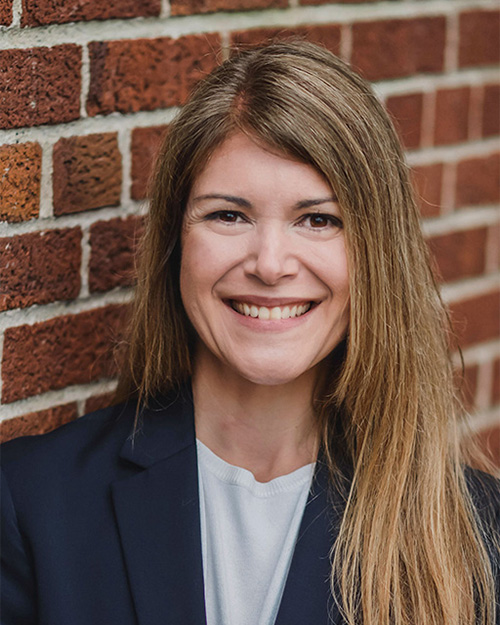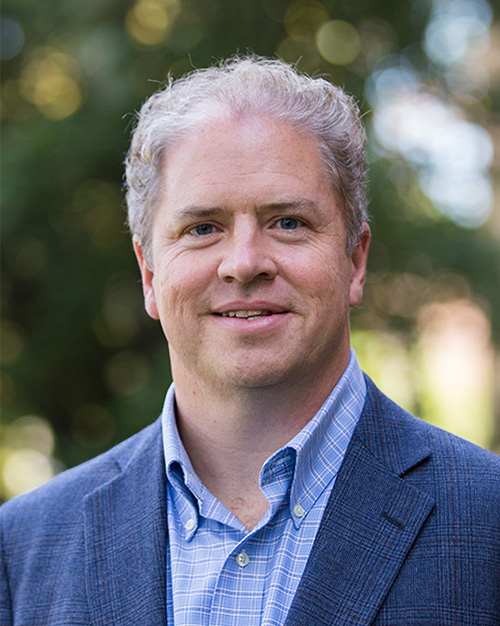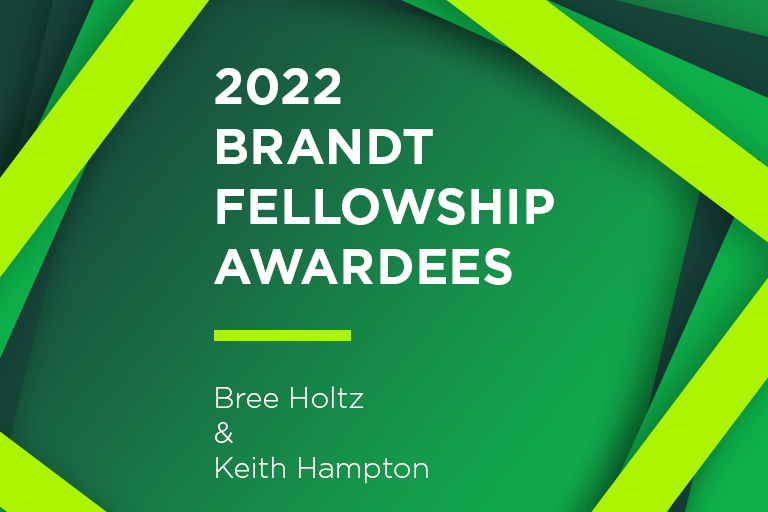Two faculty members have been honored with the 2022 ComArtSci Brandt Fellowship for Faculty Excellence, Associate Professor Bree Holtz, Ph. D., and Professor Keith Hampton, Ph.D.
Brandt Fellowship for Faculty Excellence
The fellowship program is in its second year and is supported by the Ned Brandt Faculty Excellence Fund, named for late alumnus Ellis “Ned” Brandt (BA ’43 Journalism). Brandt, a prominent Michigan philanthropist with a storied career in journalism and public relations, left a gift to the College of Communication Arts and Sciences through his estate to continue his legacy through a series of endowed professorships in all facets of communication.
It's a legacy that MSU Foundation Professor Eric Hunter, Ph.D., associate dean for research and director of the Trifecta Initiative for Interdisciplinary Health Research, fully intends to honor.
“Through this generous endowment from the Brandt estate, already exceptional instructors and faculty will be given resources to expand their influence even further,” said Hunter.
The one-year fellowship recognizes excellence in research, scholarship or creative work by faculty in MSU’s College of Communication Arts and Sciences. All full-time faculty members in ComArtSci are eligible for the $25,000 award, which can be used to strengthen ongoing activities in a particular communication domain or to build a new area of interest.
“This is something we want to do every year,” said Hunter. “This award will not only acknowledge faculty whose research or creative works are impactful — but will specifically highlight those who have helped to build a community within the College for students and colleagues. This takes a unique type of researcher whose investments may not be as readily recognized.”
“The goal of this award is to help faculty members make a real, authentic impact,” Hunter said. “That comes from doing the groundwork that just takes time and often isn’t recognized.”
Bree Holtz

Advertising + Public Relations Associate Professor Bree Holtz, Ph. D., has been teaching at ComArtSci since 2012, specializing in the development, adoption and utilization of information communication technologies in health care. With the Brandt Fellowship, Holtz plans to expand her research focus in artificial intelligence (AI) in health care communications.
“I think that AI can help bring communication — actual human communication — back into the health care visit,” said Holtz. “To allow the doctor to get back to why they probably wanted to start being a doctor anyway; to actually talk to their patients, understand what their patients are going through.”
Holtz recognizes that much of a physician’s time is spent documenting conversations with patients and searching for possible diagnoses. Her hope is that the AI technologies built at MSU can help alleviate some of those tasks that could otherwise take away time connecting with a patient and providing them with information they can use to improve their own quality of life.
Holtz seeks to address issues of fairness and ethics in current health technologies. Where conventional training and education resources may not account for differences among populations, Holtz believes AI can provide statistical probabilities based on several dynamics that could impact a given diagnosis. “I intend for this research to consider trust and uncertainty reduction in AI and health, and how those two factors relate in these kinds of communications,” she said. Part of that is keeping designers, physicians and patients involved in the process and maintaining open communication pathways throughout the implementation and use of health care technologies.
These are big goals, and Holtz doesn’t plan to achieve them alone. The first step is spreading the word that ComArtSci researchers are thinking about AI technologies in areas, such as health care, that other researchers might not expect. “There are opportunities to connect and network with other scholars at Michigan State University and other universities, which could be the foundation for a research center,” said Holtz. To begin this process, Holtz has started an AI consortium within ComArtSci, along with Assistant Professor Maria Molina, Ph.D., and Ph.D. student Victoria Nelson. It’s something she hopes this fellowship can help grow — to bring awareness to the types of expertise communicators can bring to the technology space and expand collaboration across disciplines.
Keith Hampton

Media & Information Professor Keith Hampton, Ph.D., has been teaching at ComArtSci since 2016, and is internationally known for research surrounding the implications of new media on society. With the Brandt fellowship, Hampton plans to expand on his experience in survey research, with Pew Research and the Quello Center, to find opportunities to develop a representative Michigan survey panel and eventually expand to national representativeness.
His recent research has focused on digital inequities and how the COVID-19 pandemic has impacted rural Michigan students. In the year prior to the pandemic, Hampton led a project at the Quello Center to assess potential areas of digital inequality in the state. “We did a survey of just over 20 different middle and high schools, primarily in rural Michigan, looking at the relationship between access inequalities, skill inequalities, and things like how parents respond to technologies — and its relationship to students’ academic performance, career interests, psychological well-being and other outcomes,” said Hampton. Now, more than two years since the COVID-19 pandemic began, Hampton is wrapping up a second wave of the survey. “We’ve gone back to those same schools and those same students to look at how having stronger digital skills, or better internet access before the pandemic, may have inoculated some students from some of the declines in both social and academic outcomes that have been seen as a result of the pandemic.”
Challenges with access and education drew more attention to digital inequities among communities throughout the pandemic. This project has successfully contributed a valuable foundation to start closing some of those disparities. Through the Quello Center, the team has partnered with several regional groups to map access inequalities and pair them with available funding sources. “We’ve improved the methodology that local areas in Michigan can use to identify those gaps in access. We’ve also made a convincing argument for how Michigan students are being disadvantaged as a result of these digital inequalities,” said Hampton.
However, Hampton notes that recognizing and filling those gaps in infrastructure is only a necessary first step. “The strongest predictors of student success, related to the use of digital media, tend to come from having digital skills and being in an environment that is supportive of using digital media,” said Hampton. “Schools and parents don’t often recognize the value of everyday use of digital technologies in the home, and how that might support outcomes related to students’ SAT scores, their grades and so on.”
By Jessica Mussell
